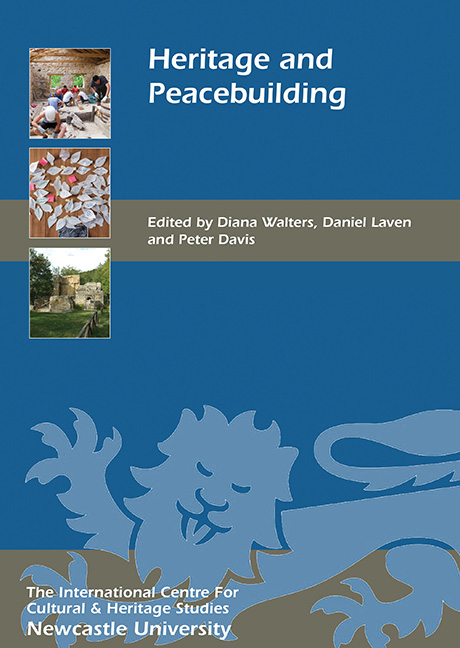Book contents
- Frontmatter
- Contents
- List of illustrations
- Acknowledgements
- List of abbreviations
- Preface
- Introduction
- NEW AND EMERGING IDEAS AROUND HERITAGE AND PEACE
- 1 The Heritage of Peace: the Importance of Peace Museums for the Development of a Culture of Peace
- 2 A Conversation with Seth Frankel: Designing Exhibitions for Peace
- 3 Public Spaces for Strangers: the Foundation for Peacebuilding and Implications for Heritage Institutions
- 4 Can Museums Build Peace? The Role of Museums in Peacebuilding and Internationalism
- 5 Information and Communication Technologies for Heritage and Peacebuilding
- 6 A Conversation with David Fleming: the Role of National Museums Liverpool in Social Justice and Peacebuilding
- HERITAGE AND PEACEBUILDING IN PRACTICE
- HERITAGE, PEACEBUILDING AND SITES
- List of Contributors
- Index
- Previous Titles
6 - A Conversation with David Fleming: the Role of National Museums Liverpool in Social Justice and Peacebuilding
from NEW AND EMERGING IDEAS AROUND HERITAGE AND PEACE
Published online by Cambridge University Press: 16 February 2018
- Frontmatter
- Contents
- List of illustrations
- Acknowledgements
- List of abbreviations
- Preface
- Introduction
- NEW AND EMERGING IDEAS AROUND HERITAGE AND PEACE
- 1 The Heritage of Peace: the Importance of Peace Museums for the Development of a Culture of Peace
- 2 A Conversation with Seth Frankel: Designing Exhibitions for Peace
- 3 Public Spaces for Strangers: the Foundation for Peacebuilding and Implications for Heritage Institutions
- 4 Can Museums Build Peace? The Role of Museums in Peacebuilding and Internationalism
- 5 Information and Communication Technologies for Heritage and Peacebuilding
- 6 A Conversation with David Fleming: the Role of National Museums Liverpool in Social Justice and Peacebuilding
- HERITAGE AND PEACEBUILDING IN PRACTICE
- HERITAGE, PEACEBUILDING AND SITES
- List of Contributors
- Index
- Previous Titles
Summary
Please describe your work – and how you see the relationship between heritage and peacebuilding from this perspective?
I am Director of National Museums Liverpool (NML), the mission of which is ‘to be the world's leading example of an inclusive museum service’. Social justice sits at the heart of what NML does, and social justice has to be fought for – it doesn't happen by itself.
Museums can be a potent force in combatting human rights abuses. They are held in high regard by the public all over the world as places where ideas can be explored. Museums are a powerful educational tool, particularly where they concern themselves with people and stories, and especially when they find an emotional voice. Moreover, museums no longer concentrate on the histories of dominant social groups – they frequently embrace the histories of minority or oppressed groups who are excluded from the mainstream because of their class, their ethnicity, their gender or their sexuality. It has become clear to me that work in museums can make a major contribution to the public understanding of human rights, and of conflict, and it is only through understanding the causes of conflict that we can hope to create sustainable peace.
How did you become involved in this kind of work?
Through our work in the International Slavery Museum (ISM – a branch of the NML), which campaigns openly against racism, I have become involved in wider global issues where the fight for human rights is paramount. Liverpool merchants were responsible for much of the transatlantic trading in enslaved Africans, and it is quite appropriate that there is a museum in Liverpool which concentrates its efforts on analysing the nature and legacies of this abominable trade.
Perhaps 30 million people are held in slavery in the modern world; many consumer products, such as coffee, cotton, fruit and rice, have links to forced labour practices in dozens of countries. In addition to slave and forced labour, there are many other instances of human rights denial, including the suppression of indigenous peoples, of women, of immigrants and of minorities.
- Type
- Chapter
- Information
- Heritage and Peacebuilding , pp. 65 - 68Publisher: Boydell & BrewerPrint publication year: 2017



